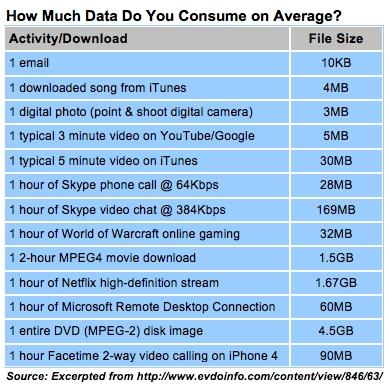- A TechNote on Wireless and Mobility
- Joanie M. Wexler
- Technology Analyst/Editor
- Editorial Director, TechNotes
So far, so good. Still, mobile operators need to take a truth-in-advertising refresher course and then make their service promises jibe with their network management practices. In other words, they should at least be attempting to manage customer expectations. You don't call a data plan that has a cap on it "unlimited." Period.
AT&T did stop selling unlimited data plans about a year ago. Existing subscribers were allowed to keep the unlimited plans, however. But then they got throttled.
 There's Unlimited and then there's Unlimited
There's Unlimited and then there's UnlimitedIn fairness, unlimited mobile data plans really were unlimited at their inception. It's just that the mobile operators - AT&T, in particular, the first to sell the bandwidth-greedy Apple iPhone - miscalculated just how much consumption the mobile data craze would drive. Sprint continues to advertise unlimited plans and can likely continue to deliver on this promise until its services become so popular that its network, too, is drenched, and the operator has to reevaluate its pricing models. (Probably a problem Sprint CEO Dan Hesse relishes having.)
From the customer side, users need to accept the world's imperfections. Despite the latest marketing mantras, you can't always get what you want - just ask Mick Jagger - and you certainly can't get it wherever you are and at any time of day or night.
Remember the proverbial busy signal when trying to make a traditional phone call on Mother's Day? It's analogous to modern-day data throttling. Sometimes, usage demand simply exceeds network capacity, and those are the breaks. Granted, that's now a rare occurrence on the PSTN, which has had the benefit of 120 years of capacity planning and build-out under its belt. But today's 3G and 4G networks are brand-spanking new in comparison, and spectrum is limited, to boot.
This is not to defend the mobile operators' broken promises and slippery-slope marketing; it's just to point out that there are two sides to every story. It's a fact that any network operator - mobile or otherwise - needs to manage its network. They have to do whatever they have to do to make sure the experience is as consistent and fair to everyone as possible. However, they don't have to imply in their advertising and collateral that they're not doing it.
Throttling vs. Cut Off
My feeling is that pulling back on the data speeds/capacity available is better than cutting users off cold - when the network is congested. Using this approach is Verizon Wireless' reported procedure, for example. However, it seems that AT&T's practice has been to automatically throttle top-consumption users regardless of whether the network was clogged or not - likely as a preventive measure - and they got throttled when their usage volumes fell under the limit of tiered plans that do have usage caps. Huh?
It's reported that AT&T network speeds slowed down considerably for customers with unlimited data plans when they reached 1.5GB to 2GB of data use, which really isn't very much consumption for a plan described as "unlimited," particularly when the operator sells a $30-per-month plan for 3GB-capped data plan. Surely, an unlimited customer should at least get the 3GB and then some.
So found a Simi Valley, Calif., small-claims court judge, who ruled in favor of plaintiff Matt Spaccarelli late last month.
Spaccarelli's unlimited plan had been throttled at under 2GB of usage, resulting in painfully slow Web browsing and the inability to conduct video streaming. Spaccarelli was awarded $850 to cover the remaining 10 months on his two-year AT&T mobile contract, the amount estimated he might have to pay in data overage charges ($85 a month).
AT&T subsequently has relaxed its throttling policy a bit, announcing that its 3G/HSPA+ customers will be network-limited only once they reach 3GB of data usage and that 4G LTE customers will be throttled when they hit 5GB of data.
The carrier also has said that customers who don't want to be throttled can switch to a tiered data plan, and their data won't be slowed. However, those users will have to pay for overages if they go over their plan limit.











This is an age-old problem. There's no such thing as delivering "better than expected" service. You can only deliver "normal" and "degraded" because the best ever delivered is seen as the norm.
So far as the exact issue of data usage on a mobile network, I have two particular "issues":
1) On a "micro" scale as a user, it is quite difficult to get an up-to-the-minute measurement of data used due to the delay in data updates from remote sites. So it's always a bit of a guessing game as to exactly how much data has been used.
2) On the other extreme as a "super-macro" scale, we are still dealing with the fact that there is only one electromagnet spectrum for wireless devices. There's no option - as there is with fiber optics - to run parallel transmission media. I fear that we will always be bumping up against this as a limitation. Wireless simply does not "scale" infinitely.